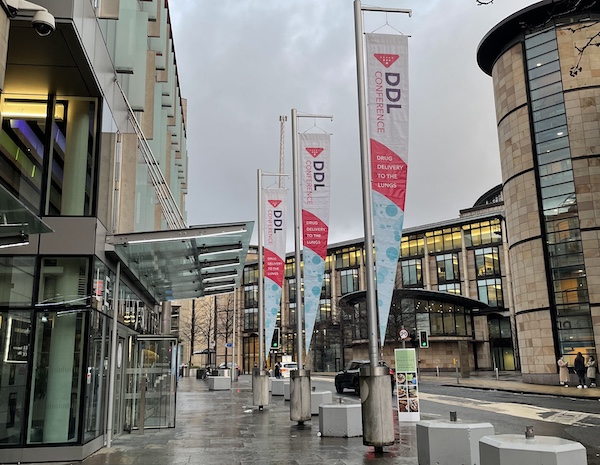The 34th iteration of the Drug Delivery to the Lungs (DDL) Conference, DDL 2023, drew approximately 930 OINDP specialists to the Edinburgh International Conference Centre (EICC) December 6 – 8, with more than 100 additional attendees joining online. The conference also drew support from 115 sponsors, including almost 20 new companies exhibiting for the first time. Nonclinical testing of inhaled drugs; novel formulation strategies for pulmonary delivery; and environmental concerns were among the trends addressed by speakers, poster authors, and exhibitors at this year’s meeting.
Nonclinical testing
The scientific portion of the conference opened with the 2023 DDL Annual Lecture, presented by Daniela Traini of Macquarie University, whose talk was titled, “Of Mice and Men: Correlation and Clinical Relevance of Animal Models and Nonclinical Tests for Inhaled Pharmaceuticals.” Traini noted that instead of organizing the lecture around her work, she would discuss the repercussions of the 2022 FDA Modernization Act 2.0, which allows alternatives to animal testing.
Traini pointed out several reasons for change to testing requirements, including ethical considerations, difficultly finding sufficient animals during the pandemic, cost, and regulatory complexity, as well as the growing availability of nonclinical testing. In addition, she said, while various animal models such as guinea pigs, ferrets, sheep, and humanized mice have been quite useful in the development of a number of inhaled drugs currently on the market, the predictive value of animal testing is limited.
Citing the approval of generic mometasone furoate nasal spray in the EU based only on in vitro testing, Traini said that she wondered about applying the same principles for approval of generics of other currently approved drugs, though pointed out that such testing might not accurately represent how the drug interacts with the body. In vitro cell-based assays, such as the cell models and cell-integrated impactor developed at Macquarie, she suggested, might solve some of those problems. She also cited the physiologically relevant air-interface model developed at Macquarie by Hui Xin (YY) Ong, who presented a talk on those models during DDL 2021.
From there, Traini moved on to organ-on-a-chip lung models such as Macquarie’s microfluidic chip that allows for investigation of complex issues like permeability and, with the ability to grow different kinds of cells; to mimic different environments; and to perform real-time monitoring of various parameters. Among the limitation of those types of models, she noted, are difficulty in doing long-term studies and an inability to accurately model interactions with microbiota, which she called “the holy grail.”
In silico models can be useful for understanding deposition of particles in the lung and their interactions with the surface of the lung, Traini said, while also acknowledging the difficulty of validating the models, scale up, and a lack of standardization. She addressed the increasing use of artificial intelligence, pointing to In Silico Medicine’s use of AI for discovery of a molecule that the company is developing as an inhaled therapy for the treatment of idiopathic pulmonary fibrosis. Citing the DDL2021 Annual Lecture presented by Sabine Häussermann, which covered many aspects of AI in respiratory medicine, Traini echoed Häussermann’s caveat regarding artificial intelligence — “rubbish in, rubbish out” — and noted additional issues related to privacy and regulatory concerns.




